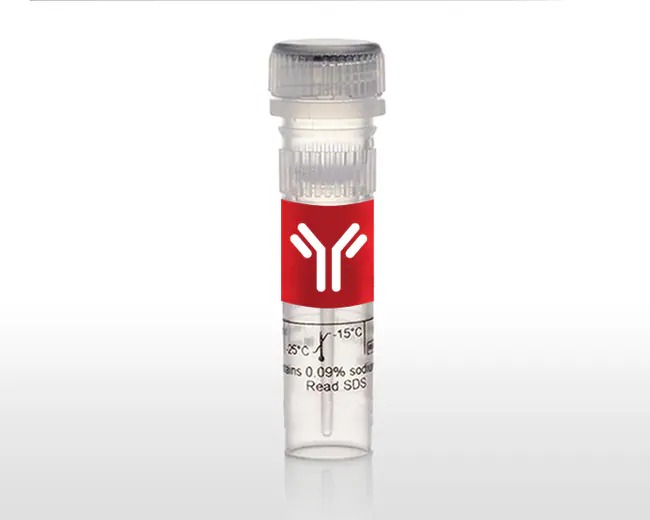Invitrogen™ eBioscience™ CD197 (CCR7) Monoclonal Antibody (3D12), APC
Catalog No :
CAS Number :
Brand :
In Stock
Specifications:
| Application | Flow Cytometry | ||
| Storage Temperature | 2-8°C | ||
| Product Type | antibody | Forms | Liquid |
| Product Brand | Thermo Fisher Scientific™ | ||
| Product Grade | Molecular Biology | ||
Invitrogen™ eBioscience™ CD197 (CCR7) Monoclonal Antibody (3D12), APC
The Invitrogen™ eBioscience™ CD197 (CCR7) Monoclonal Antibody (3D12) is a high-quality antibody conjugated to APC (Allophycocyanin), specifically designed for use in flow cytometry applications. It is pre-titrated and optimized to detect CCR7 (CD197), a chemokine receptor critical for the migration, homing, and positioning of immune cells, particularly T cells and dendritic cells.
Key Features
- Target Molecule (CCR7/CD197):
- CCR7 is a chemokine receptor involved in immune cell trafficking and homing to lymphoid tissues. It plays a crucial role in adaptive immunity by guiding naive and central memory T cells to secondary lymphoid organs (1).
- Expressed on T cell subsets, dendritic cells, and other leukocytes, CCR7 regulates immune responses and is implicated in tumor microenvironments and inflammatory diseases (2, 3).
- Conjugate:
- APC is an ideal fluorochrome for multicolor flow cytometry panels, with an excitation maximum of 650 nm and an emission maximum of 660 nm, compatible with red lasers (4).
- Applications:
- Designed for flow cytometric analysis of human immune cells.
- Commonly used for immune cell phenotyping, T cell subset analysis, and studies involving cell migration and homing (5).
- Format and Purification:
- Provided in a liquid formulation, purified via affinity chromatography, and stabilized in PBS with 0.2% BSA and 0.09% sodium azide to ensure reliability (6).
Specifications
| Property | Details |
|---|---|
| Clone | 3D12 |
| Host/Isotype | Mouse / IgG2b, kappa |
| Conjugate | APC (Allophycocyanin) |
| Excitation/Emission | 650 nm / 660 nm |
| Species Reactivity | Human |
| Applications | Flow cytometry |
| Concentration | 5 µL/test (1 µg/test) |
| Formulation | PBS (pH 7.2), 0.2% BSA, 0.09% sodium azide |
| Storage Conditions | 4°C, store in the dark; DO NOT FREEZE |
| Shipping Conditions | Ambient (domestic); Wet ice (international) |
| Regulatory Use | Research Use Only |
Applications
- Immune Cell Phenotyping:
- Identify and characterize CCR7-expressing T cells, including naive and central memory T cell subsets (7).
- Flow Cytometry:
- Quantify CCR7 expression on human T cells and dendritic cells in immune system studies.
- Cancer and Tumor Microenvironment Studies:
- Analyze CCR7's role in tumor progression and immune evasion by facilitating T cell and dendritic cell migration (8).
- Migration and Homing Research:
- Study CCR7's involvement in lymphocyte homing to secondary lymphoid tissues and its dysregulation in diseases such as chronic inflammation and autoimmune disorders (9).
Handling and Storage
- Storage Conditions: Store at 4°C in the dark to prevent fluorochrome degradation. Avoid freezing, as this may damage the antibody and APC conjugate.
- Sample Preparation: Compatible with IC Fixation Buffer (Product #00-822-49) or 1-step Fix/Lyse Solution (Product #00-5333-54) for post-staining cell fixation (10).
Key Advantages
- Reliable Performance:
- Pre-titrated for consistent and reproducible results in flow cytometry.
- APC Conjugation:
- Excellent brightness and minimal spectral overlap make it ideal for complex multicolor panels.
- High Specificity:
- Validated for human immune cell detection with low non-specific binding.
- Versatility:
- Suitable for both basic research and advanced immune system studies.
Target Information
CCR7, also known as CD197, is a chemokine receptor essential for immune cell trafficking to lymphoid tissues. It binds to CCL19 and CCL21 ligands, facilitating the migration and positioning of naive and central memory T cells, as well as dendritic cells, in secondary lymphoid organs (11). Dysregulation of CCR7 expression has been implicated in autoimmune diseases, chronic inflammation, and cancer metastasis (12).
References
- Förster, R., et al. "CCR7 and its ligands: balancing immunity and tolerance." Nature Reviews Immunology 8.5 (2008): 362-371.
- Willimsky, G., et al. "CCR7 regulates T cell homeostasis and migration." Immunity 28.5 (2008): 743-755.
- Kim, C. H., et al. "CCR7 in immune responses and diseases." The Journal of Immunology 173.2 (2004): 711-720.
- Robinson, J. P. "APC fluorescence in multicolor flow cytometry." Current Protocols in Cytometry (2008): 6.1.1-6.1.19.
- Zlotnik, A., et al. "Chemokines and chemokine receptors: insights into their roles in tumor biology." Cancer Letters 267.2 (2008): 167-182.
- Invitrogen™ Datasheet for CD197 Monoclonal Antibody, APC (Product #11-1979-42).
- Sallusto, F., et al. "Central memory and effector memory T cell subsets." Nature Reviews Immunology 4.11 (2004): 844-856.
- Müller, G., et al. "Role of CCR7 in cancer metastasis and immune evasion." Oncogene 30.12 (2011): 1475-1482.
- Hauser, M. A., et al. "CCR7 directs dendritic cells to lymphoid tissues." The Journal of Experimental Medicine 206.5 (2009): 1283-1296.
- Invitrogen™ Fixation Buffer Protocol, Product #00-822-49.
- Kunkel, E. J., et al. "CCR7: linking lymphoid tissue trafficking and immune response." Immunity 16.3 (2002): 297-309.
- Stein, J. V., et al. "CCR7 in autoimmune diseases and chronic inflammation." Trends in Immunology 27.3 (2006): 168-175.
The Invitrogen™ eBioscience™ CD197 (CCR7) Monoclonal Antibody (3D12), APC is an essential reagent for studying immune cell trafficking, lymphocyte subsets, and their roles in health and disease. Its reliable performance, coupled with its versatility, makes it an indispensable tool for immunological research.
- Pack Size: For 100 Tests for 25 Tests




 0
0
